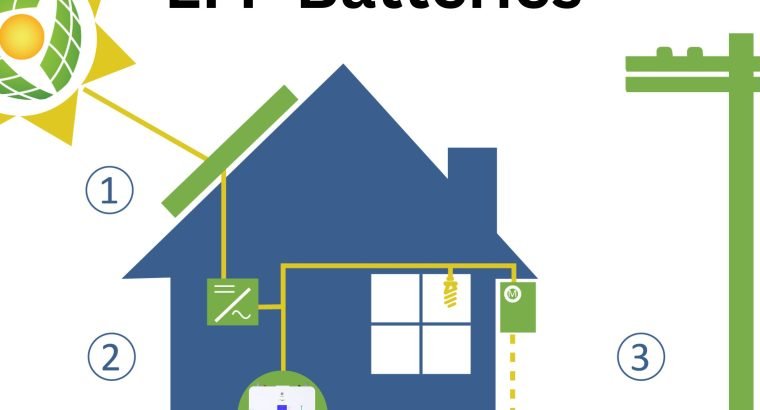The Benefits Of Using LFP Batteries For Solar Storage

LFP stands for Lithium Iron Phosphate, which is a type of lithium-ion battery chemistry. LFP or LiFePO4 batteries are known for their high stability, safety, and long cycle life compared to other lithium-ion battery chemistries.
LiFePO4 Batteries are commonly used in energy storage systems, electric vehicles, and other applications that require a safe, long-lasting power source. The use of LiFePO4 batteries in these applications is driven by their low risk of thermal runaway, high power density, and low self-discharge rate.
Advantages of LFP Batteries
Lithium iron phosphate (LiFePO4 or LFP) batteries have several advantages when used in solar energy storage systems
- Safe and Stable Chemistry: LFP batteries have a stable chemical composition, making them less likely to overheat or catch fire compared to other lithium-ion battery chemistries. This makes them a safer option for use in solar energy storage systems.
- Long Cycle Life: LFP batteries have a long cycle life. LIFePO4 Batteries can be charged and discharged many times without losing capacity. This makes them a cost-effective option for solar energy storage over the long term.
- Wide Operating Temperature Range: LiFePO4 batteries can operate effectively over a wide temperature range. The wide operating Temperature Range makes them ideal for use in harsh environmental conditions, such as hot or cold climates.
- Low Self-Discharge: LFP batteries have a low self-discharge rate. It’s meaning they retain their charge for a long time when not in use. This is particularly beneficial in solar energy storage systems, where the battery may not be in use for extended periods.
- High Efficiency: LiFePO4 batteries have a high charging and discharging efficiency. LFP Batteries can convert a high percentage of the energy stored in the battery into useful power. This makes them an efficient option for solar energy storage.
- Lightweight and Compact: LiFePO4 batteries are lightweight and compact, making them easy to transport and install. Compact size is beneficial for solar energy storage systems, where space may be limited.
- Low Maintenance: LFP batteries have a low maintenance requirement and do not require regular topping up with water. Low or zero maintenance makes them a convenient option for solar energy storage.
Comments are closed.

[…] lithium-ion battery that uses a cathode made up of a combination of nickel, manganese, and cobalt. LFP, on the other hand, stands for Lithium Iron Phosphate, and is a type of lithium-ion battery that […]
[…] and energy storage batteries offer a more reliable solution compared to central inverters and traditional grid-tied systems. […]